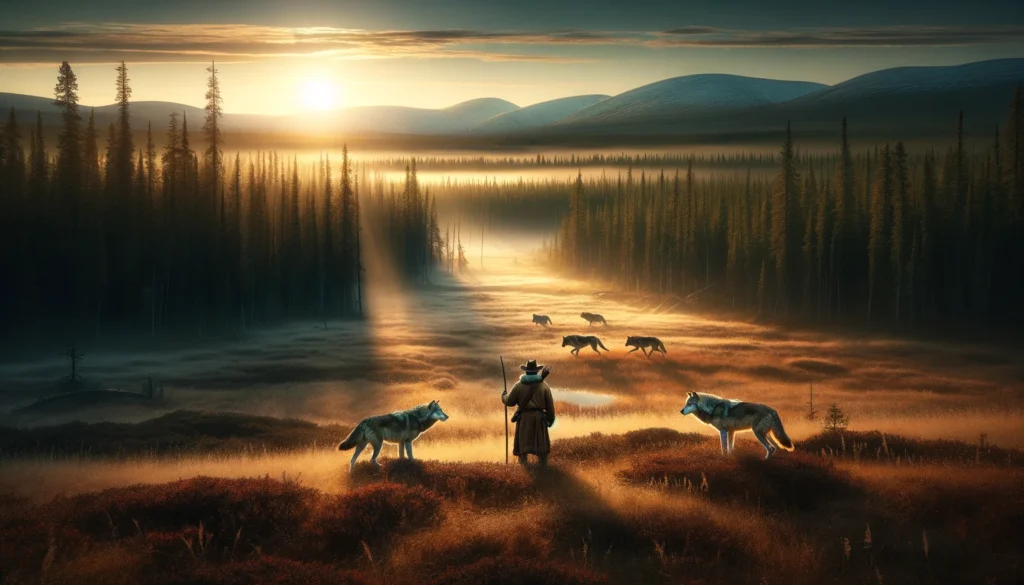The Primal Alliance: Understanding the Dynamics of Hunting with Wolves

Table of Contents
Introduction
The concept of hunting alongside wolves, a practice that harks back to ancient times, evokes a profound connection between humans and the natural world. This intricate dance between two apex predators offers unique insights into the behavior, strategies, and survival instincts of wolves, providing lessons that can be applied to modern hunting and conservation efforts. This article explores the fascinating dynamics of hunting with wolves and how this ancient partnership can inform contemporary practices.
The Historical Bond Between Humans and Wolves
The relationship between humans and wolves stretches back thousands of years, likely originating from mutual benefits in hunting. Early humans observed and learned from them, gaining insights into tracking, ambushing, and the strategic patience required to hunt effectively. Over time, this relationship evolved, leading to the domestication of some wolves into what we now recognize as dogs, our hunting companions.
Learning from Wolves: Tactics and Strategies
Pack Coordination and Communication
Wolves hunt in packs, using complex communication and coordination to outmaneuver their prey. Human hunters can learn from these tactics, applying teamwork and silent signals to improve their own hunting strategies.
Endurance and Persistence Hunting
Wolves are known for their endurance, often engaging in persistence hunting where they exhaust their prey over long distances. This technique highlights the importance of stamina and persistence, qualities that are valuable for human hunters as well.
Adaptability and Environmental Awareness
Wolves are highly adaptable, able to hunt in various environments and conditions. Their success relies on an intimate knowledge of their territory. For human hunters, understanding the environment and adapting to changing conditions are crucial skills for success.
The Ethical Considerations of Hunting Near Wolves
Respecting Wildlife and Ecosystems
Hunting in areas inhabited by wolves demands a deep respect for wildlife and the ecosystems that support them. It’s essential to ensure hunting practices do not disrupt the natural balance or endanger their populations.
Conservation and Coexistence
Modern hunting practices can coexist with wolf conservation efforts. By understanding wolf behavior and territories, hunters can minimize conflicts, contributing to the preservation of healthy wolf populations and ecosystems.
Contemporary Implications and Lessons
Conservation Through Understanding
Studying the hunting strategies of wolves offers valuable lessons in wildlife management and conservation. By adopting a respectful and informed approach to hunting, humans can play a role in maintaining the balance of natural ecosystems.
The Role of Modern Hunters
Today’s hunters have the opportunity to advocate for and participate in conservation efforts, ensuring that the primal alliance between humans and wolves continues to inform and enrich our understanding of the natural world.
Conclusion
The ancient practice of hunting with wolves offers a window into the past, revealing a time when humans and they shared a mutual respect and reliance. By studying and respecting these primal hunters, modern humans can learn valuable lessons in teamwork, endurance, and adaptability, all while fostering a deeper connection with the natural world. As we move forward, let the legacy of this ancient alliance inspire a future where hunting and conservation go hand in hand, ensuring the preservation of our planet’s majestic wildlife and their habitats.
Frequently Asked Questions (FAQs)
1. Did humans really hunt alongside wolves?
Yes, historical evidence suggests that early humans observed and possibly cooperated with them in hunting, leading to mutual benefits and the eventual domestication of dogs.
2. What can modern hunters learn from wolves?
Modern hunters can learn from wolves’ teamwork, communication, endurance, and adaptability to improve their own hunting strategies and success rates.
3. How does hunting near wolves affect conservation efforts?
Responsible hunting practices that respect their territories and behaviors can coexist with conservation efforts, contributing to the health of ecosystems.
4. What role do hunters play in wildlife conservation?
Hunters play a significant role in conservation through sustainable practices, funding wildlife management programs, and advocating for the preservation of natural habitats.
5. Can studying wolf behavior improve our understanding of prey animals?
Absolutely. Wolves choose their prey based on specific criteria, including age, health, and behavior. By studying how wolves select and stalk their prey, hunters can gain insights into the vulnerabilities and habits of various game species, leading to more ethical and effective hunting strategies.







